- Home
- Donald Hamilton
Death of a Citizen mh-1 Page 3
Death of a Citizen mh-1 Read online
Page 3
CHAPTER 6
FRAN Darrel kissed me goodnight at the door. Amos kissed Beth. It's an old Spanish custom which Beth detests. Just about the time she outgrew the unpleasant chore of kissing her New England aunts and grandmothers, and could get a little selective in her osculation, she married me and moved to New Mexico, where, she discovered to her horror, it was her social duty to take on all corners.
Amos, to do him justice, was one of the less objectionable male kissers of our acquaintance, satisfied with a token peck on the cheek. I think he made that much of a concession to local custom only because Fran had told him that he might hurt the feelings of some of her friends if he didn't. In a11 social matters Amos took his cue from Fran, since it didn't mean a thing to him, anyway.
Afterwards, he stood there with his vague, bored look while the women went through their goodbye chatter; and I stood there, and found myself suddenly wishing he'd get the hell back inside and out of the light. A guy of his scientific importance ought to have more sense than to hang around in a lighted doorway below a ridge full of desert cedars that could conceal a regiment of expert riflemen. It was a melodramatic idea, but Tina and Loris had started my mind working in that direction. Not that Mac's people were any threat to Amos, but their presence meant trouble, and once there's trouble around, anybody's apt to find a piece of it coming his way.
"It was sweet of you to come," Fran was saying. "I do wish you wouldn't rush off. Mart, you have a nice trip, hear?"
"The same to you," Beth said.
"Oh, we'll see you again before we leave."
"Well, if you don't, I hope you have a wonderful tune. I'm green with envy," Beth said. "Good night."
Then the Darrels were turning away and entering the house together, and nothing whatever had happened to either of them, and we were walking towards Beth's big maroon station wagon where it stood gleaming with approximately four thousand dollars worth of gleam in the darkness.
I asked, "Where are they going?"
"Why, they're going to Washington next week," Beth said. "I thought you knew." -
I said, "Hell, Amos was in Washington only two months back."
"I know, but something important has come up at the lab, apparently, and he's got to make a special report. He's taking Fran along, and they're going to visit her family in Virginia and then have some fun in New York before they come back here." -
Beth's voice was wistful. To her, real civilization still ended somewhere well east of the Mississippi. She always had a wonderful time in New York, although the place always gives me claustrophobia. I like towns you can get out of in a hurry.
"Well, we'll try to make New York some time this winter, if things go well," I said. "Meanwhile we'd better settle on a place to eat tonight. If we take our time, maybe Mrs. Garcia will have the kids in bed when we get home."
We had dinner at La Placita, which is a joint on the narrow, winding, dusty street sometimes known as Artists' Row by people who don't know much about art. There were checked tablecloths and live music. Afterwards we got back into Beth's shining twenty-foot chariot. If Beth had married a New York broker and settled in a conventional suburb in her native Connecticut, I'm sure she'd have become an enthusiastic Volkswagen booster. It would have been her protest against the conformity around her. In Santa Fe, where they never heard of the word conformity, and with a screwball author for a husband, she needed the Buick to keep her sense of proportion. It was a symbol of security. She glanced at me quickly as I drove past our street without turning in.
"Give them a little more time to go to sleep," I said. "Don't you ever put gas in this bus?"
"There's plenty," she said, leaning against me sleepily. "Where are we going?"
I shrugged. I didn't know. I just knew I didn't want to go home. I could still see Tina's black-gloved hand gracefully giving me the old stand-by signal. If I went home, I'd be expected to make myself available, somehow-take a walk around the house to find the cat, have a midnight burst of inspiration and dash out to the studio to get it down on paper. I was supposed to place myself alone so they could reach me, and I didn't want to be alone. I didn't want to be reached.
I took us through the city through the sparse evening traffic and sent the chrome plated beast snarling up the long grade out of town on the road to Taos, sixty miles north. There should have been a release of sorts in turning loose all that horsepower, but all it did was remind me of the big black Mercedes I'd stolen outside Loewenstadt-it was the assignment after I'd kissed Tina goodbye and lost track of her-with a six-cylinder bomb under the hood, a four-speed transmission as smooth as silk, and a suspension as taut and sure as a stalking tiger. When I'd glanced at the speedometer-on a dirt road, yet-the needle was flickering past a hundred and eighty kilometers per hour, which translates to a hundred mph and some change. And I'd thought I was kind of babying the heap along. -
It almost scared me to death, but for the rest of that job I was known as Hot Rod, and all driving chores that came up were left to me without argument, although I could get an argument from that bunch of prima donnas on just about any other subject… Well, I never saw any of them again, and some of them hated my guts and ~ wasn't very fond of theirs, but we moved our sniper into position and made our touch on schedule, so I guess it was a pretty good team while it lasted. Mac didn't believe in letting them last very long. One or two assignments, and then he'd break up the group and shift the men around or send them out to lone-wolf it for a while. Men-even our kind of men-had a perverse habit of getting friendly if they worked together too long; and you couldn't risk jeopardizing an operation because, despite standing orders, some sentimental jerk refused to leave behind another jerk who'd been fool enough to stop a bullet or break a leg.
I remembered solving that little problem the hard way, the one time it came up in a group of mine. After all, nobody's going to hang around in enemy territory to watch over a dead body, no matter how much he liked the guy alive. I'd had to watch my back for the rest of the trip, of course, but I always did that, anyway.
"Matt," Beth said quietly, "Matt, what's the matter?"
I shook my head, and spun the wheel to put us onto the unpaved lane that feeds into the highway at the top of the hill. The big station wagon was no Mercedes. The rear end broke loose as we hit the gravel, and I almost lost the heap completely-power brakes, power steering, and all. For a moment I had Buick all over the road. It gave me something to fight, and I straightened it out savagely; the rear wheels sprayed gravel as they dug in. I took us up on the ridge, with those soft baby-carriage springs hitting bottom on the bumps, and swung in among the pinons and stopped.
Beth gave a little sigh, and reached up to pat her hair back into place.
"Sorry," I said. "Lousy driving. Too many Martinis, I guess. I don't think I hurt the car."
Below us were the lights of Santa Fe, and beyond was the whole dark sweep of the Rio Grande valley; and across the valley were the twinkling lights of Los Alamos, in case you were interested, which, unlike Amos Darrel, I was not. They no longer make so many loud disturbing noises over there, but I'd liked the place better when it was just a pinon forest and a private school for boys. Whatever it was Amos had turned up in his lab, and was rushing to Washington to make his report on, I had a hunch it was something I could have lived quite happily without.
Looking the other way, you could see the shadowy Sangre de Cristo peaks against the dark sky. They'd
already had a sprinkle of snow up there this fall; it showed up ghostly in the night.
Beth said softly, "Darling, can't you tell me?"
It had been a mistake to come up here. There was nothing I could tell her; and she didn't belong to the catch-as-catch-can school of marital relations. In my wife's book, there was a time and a place for everything, even love. And the place wasn't the front seat of a car parked a few feet off a busy highway.
I couldn't talk to her, and I wasn't in a mood for anything as mild and frustrating as necking, so there w
asn't a damn thing to do but back out of there and head for home.
CHAPTER 7 -
MRS. Garcia was a plump, pretty woman who lived only a few blocks away, so that, except in bad weather or very late at night, she did not have to be driven home. I paid her, thanked her, saw her to the door, and stood in the doorway watching her walk along the concrete path to the gate in our front wall. Like many Santa Fe residences, ours is fortified against invasions of our privacy by six feet of adobe wall ten inches thick. After she'd gone, closing the gate behind her, it seemed very quiet.
I listened to Mrs. Garcia's receding footsteps and to the sound of a lone car going past outside the wall. There was no sound inside and no movement except for our large gray tomcat-named Tiger by the children despite a total lack of stripes-who made a quick, silent pass at the door, hoping to slip inside unnoticed. I closed the screen in his face, locked the door, and reached for the switch to turn out the yard lights. They could be controlled from the front door, the kitchen, the studio, and the garage, and they had cost a pretty sum to install. Beth could never understand why we'd had to spend the money. She'd never lived in such a way as to consider it a luxury, at night, to be able to hit a single switch and determine, at a glance, that there was no enemy inside the walls.
I let my hand fall from the switch without pressing it. Why should I make life easy for Tina and her friend? When I turned away, Beth was watching me from the arch of the hallway that led back to the children's bedrooms.
After a moment, she said, without mentioning the lights, "All present and accounted for. Where's the cat?" If not exiled at night, the beast will hide under the furniture until we've retired, and then jump in bed with one of the kids. They don't mind in the least, not even the baby, but it seems unsanitary.
"Tiger's all right. He's outside," I said.
She watched me cross the room to her without smiling or speaking. The light was soft on her upturned face. There's something very nice about a pretty woman at the end of a party evening when, you might say, she's well broken in. She no longer looks and smells like a new car just off the salesroom floor. Her nose is maybe just a little shiny now, her hair is no longer too smooth to caress or her lipstick too even to kiss, and her clothes
have imperceptibly begun to fit her body instead of fitting some mad flight of the designer's fancy. And in her mind, you can hope, she's begun to feel like a woman again, instead of like a self-conscious work of art.
I pulled her to me abruptly and kissed her hard, trying to forget Tina, trying not to wonder what Mac wanted with me after all these years. Whatever it was, it wouldn't be nice. It never had been. I heard Beth's breath catch at my roughness; then she laughed and threw her arms around my neck and kissed me back just as hard, playfully wanton, coming against me shamelessly and fitting her mouth to mine with deliberate disregard for whatever lipstick she had left. It was a game we sometimes played, pretending to be real wicked, uninhibited people.
"That's better," she whispered a little breathlessly. "You've been looking like a thunderstorm all evening. Now let me go and… Matt, don't!"
It was a game, and I was supposed to know the moment to take time out and let her escape to the bedroom and make a quick change into a pretty nightie, but I couldn't seem to make myself abide by the ground rules tonight. I heard her gasp with surprise and apprehension as I swung her around and let her down on the nearby sofa, following her down and lying against her. But her lips were soft and unresponsive now. Her breast was remote behind layers of clothing.
"Please, darling," she whispered, turning her face from me, "please, Matt, my dress..
There are times when a husband can't help remembering that he's a fairly large man and his wife's a relatively small girl and that if he really wants to… I put the thought aside. I mean, hell, you can't go around raping people you love and respect. I got up slowly and took out my handkerchief and scrubbed my mouth. I walked to the front door and stood looking out through the glass at the lighted yard, hearing her rise behind me and go quickly out of the room.
Presently I heard the bathroom door close. I turned and walked into the empty bedroom and started to pull off my tie, but changed my mind. My suitcase was already packed, standing by the foot of my bed. Like most old southwestern houses, ours was built with a complete lack of closet space and we've never quite made up the deficiency; in consequence, such things as camping clothes and equipment have to be stored out in the garage and studio. Part of what I needed had already been loaded in the pickup, the rest was ready and waiting for me. By morning I could be in Texas. Normally, I have a good New Mexican's aversion to that loudmouthed state and all its residents, but at the moment it seemed like a fine place to be.
I carried the suitcase to the kitchen door, deposited it there, and stepped down the hail to look in on the baby. Further down the hall there was Matt, Jr., aged eleven, and Warren, aged nine, but they were getting a little too big to get mushy about at night. But you never quite get used to the sight of your own babies, I guess; they always seem like a cross between a practical joke and a miracle from heaven. Our youngest, Betsy, sound asleep, had wispy blonde baby-hair and a square, pretty little face that was lengthening out now as she got her first teeth. She was not quite two. Her head still looked too big for her body, and her feet looked too small for anything human. I heard a sound behind me as I covered her up, and turned to face Beth.
I said, "Shouldn't she have a sleeper on?" When you've nothing whatever to say to your wife as man to woman, you can always fall back on acting like a parent.
"There aren't any; she wet the last pair," Beth said. "Mrs. Garcia washed it out, but it isn't dry yet."
I said, "I think I'll throw my gear into the truck and take off. I can be halfway to San Antonio by morning."
She hesitated. "Should you? After all those Martinis?" This wasn't, I suspected, exactly what she wanted to say, but it was what came out.
"I'll take it easy. If I get sleepy, I can always pull off the road and take a nap in back." It wasn't precisely what I wanted to say, either, but we seemed to have lost the knack of accurate communication.
We looked at each other for a moment. She was wearing something filmy and pale blue with a negligee of the same stuff, and she looked like an angel, but the moment was past, and I could work up no real interest in nylon angels, not even when I kissed her lightly on the lips.
"So long," I said. "I'll call you tomorrow night if I can, but don't worry if you don't hear from me. I may be camping out."
"Matt…" she said, and then, quickly, "never mind. Just drive carefully. And send some cards to the boys; they love to get mail from you."
Crossing the rear patio in the glare of the lights, I unlocked and pushed wide the big gates that open into the alley that runs alongside our property. In Santa Fe, you're apt to find alleys anywhere. Before we bought the place, the studio was rented as a separate apartment, and the tenant, who didn't have garage privileges, parked his car in the alley. I carried the suitcase into the garage and threw it into the bed of the pickup, which is covered by a metal canopy with small windows at front and sides and a door facing aft. Upon the door, for all following drivers to see, my oldest son had pasted a sticker reading: DON'T LAUGH, IT'S PAID FOR.
I opened the garage doors, drove out into the alley, closed up the garage, returned to the truck, and backed it in through the big gate and up to the studio door. Leaving the motor running to warm it up thoroughly, I went into the studio, which is an L-shaped building at the rear corner of the lot, with thick adobe walls like the main house. One wing of the L serves me as a kind of sitting and reading room, with a studio couch that becomes a bed in emergencies. Around the corner are my files and typewriter. The little cubicle next to the bathroom, which used to be the apartment kitchen, is now my darkroom.
I changed into jeans, a wool shirt, wool socks, and a pair of the light-colored, low-heeled, pull-on boots with the rough side of the leather showing that are sometimes known locally as f
ruit-boots, being the preferred footgear of a few gentlemen whose virility is subject to question. The appellation is doubtless unfair to a lot of very masculine engineers, not to mention, I hope, one writer-photographer. Dressed, I hauled my bedroll out to the truck, and then loaded the camera cases, as well as the little tripod for the Leicas and the big tripod for the 5x7 view camera. This last I probably wouldn't use once in three thousand miles, but it sometimes came in handy, and driving alone I had plenty of room.
Having been a newspaper photographer before the war puts me in the pleasant position of being able to work both sides of the street. I planned to use the projected trip first for an illustrated article, after which I'd turn around and put the material into a book of fiction.
I wasn't thinking about much of anything, now, except getting packed and away before something happened to stop me. I looked around to see what I'd forgotten, and went around the corner to my desk and reached for my keys to unlock the drawer that held the short-barreled Colt Woodsman.22. I might be a peaceful citizen now, but the little automatic pistol had been my traveling companion too long to be left behind. Starting to put the key into the lock, I saw that the drawer was already open a quarter of an inch.
I stood looking at it for perhaps a minute. Then I put the keys away and pulled the drawer fully open. There was, of course, no longer any pistol inside.
Standing there, I pivoted slowly, searching the room with my eyes. Nothing else seemed to've changed since I'd left the place that afternoon. The other guns were still undisturbed in their locked wall rack. I took a step to the side so that I could look back into the sitting and-reading area. This, too, seemed unchanged. There were the usual sheaves of yellow copy paper cluttering up the furniture: I'd spent the day kicking around some story ideas I thought might fit what I expected to see in Texas. There was a Manila envelope on the arm of my big reading chair. The place is always lousy with those, too, but it occurred to me now that I hadn't seen this particular one before.

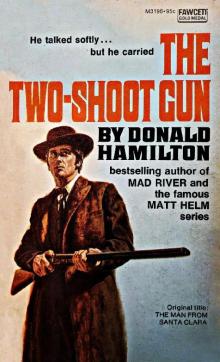 The Two-Shoot Gun
The Two-Shoot Gun Mad River
Mad River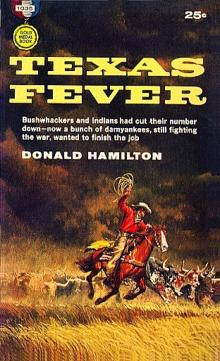 Texas Fever
Texas Fever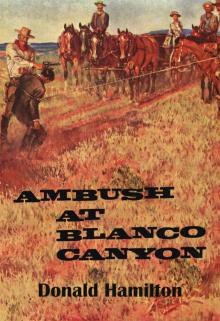 Ambush at Blanco Canyon
Ambush at Blanco Canyon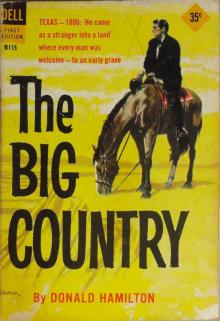 The Big Country
The Big Country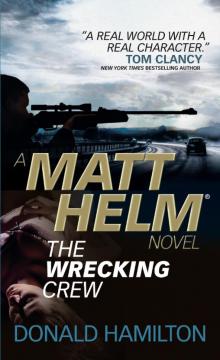 The Wrecking Crew
The Wrecking Crew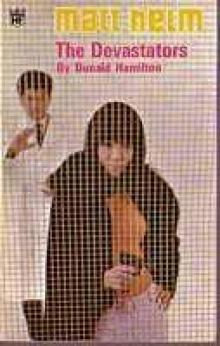 The Devastators mh-9
The Devastators mh-9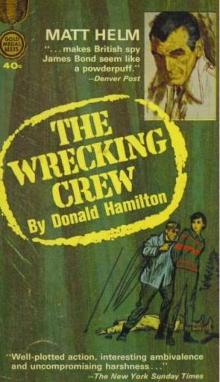 The Wrecking Crew mh-2
The Wrecking Crew mh-2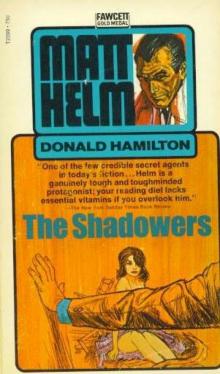 The Shadowers mh-7
The Shadowers mh-7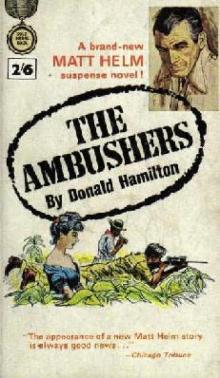 The Ambushers mh-6
The Ambushers mh-6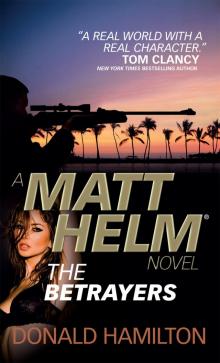 The Betrayers
The Betrayers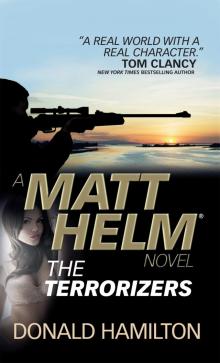 The Terrorizers
The Terrorizers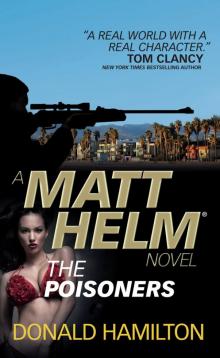 The Poisoners
The Poisoners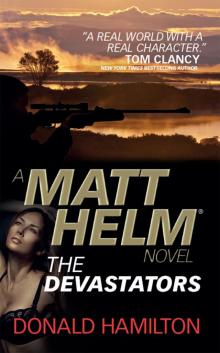 The Devastators
The Devastators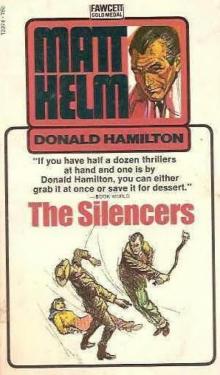 The Silencers mh-5
The Silencers mh-5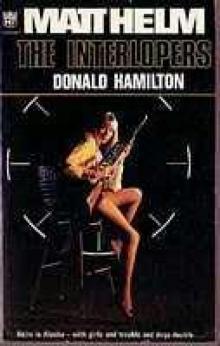 The Interlopers mh-12
The Interlopers mh-12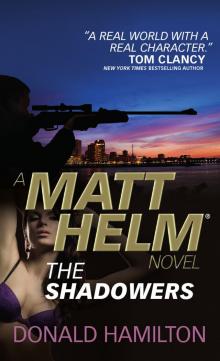 The Shadowers
The Shadowers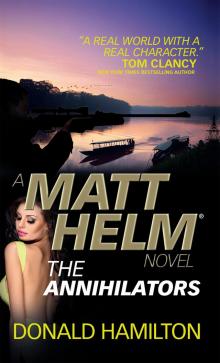 The Annihilators
The Annihilators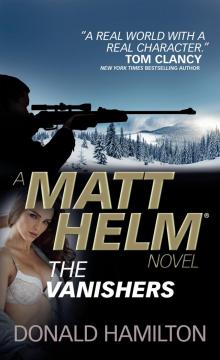 The Vanishers
The Vanishers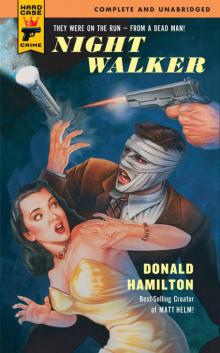 Night Walker
Night Walker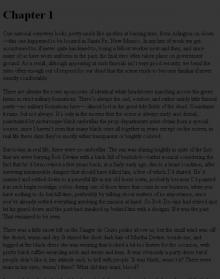 The Revengers
The Revengers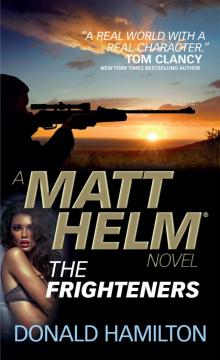 The Frighteners
The Frighteners The Infiltrators
The Infiltrators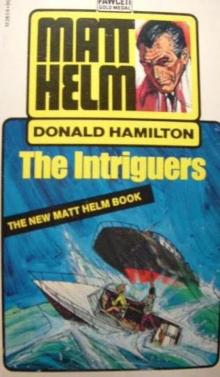 The Intriguers mh-14
The Intriguers mh-14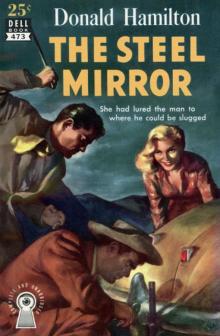 The Steel Mirror
The Steel Mirror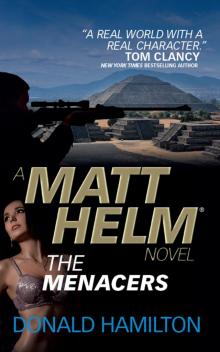 The Menacers
The Menacers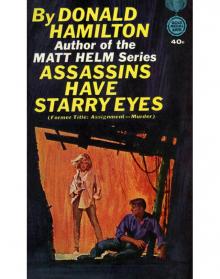 Assassins Have Starry Eyes
Assassins Have Starry Eyes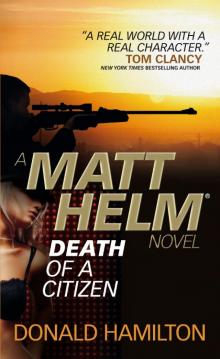 Death of a Citizen
Death of a Citizen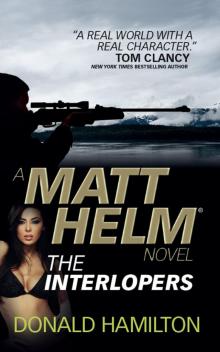 Matt Helm--The Interlopers
Matt Helm--The Interlopers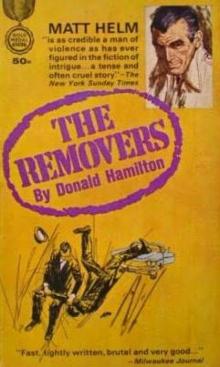 The Removers mh-3
The Removers mh-3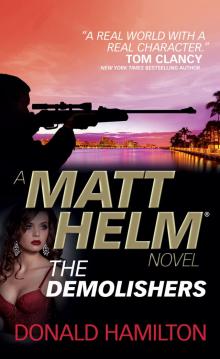 The Demolishers
The Demolishers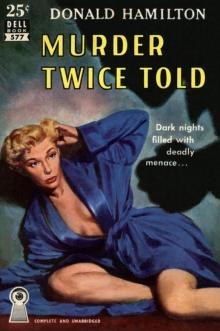 Murder Twice Told
Murder Twice Told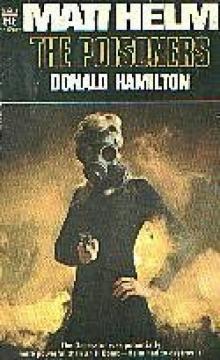 The Poisoners mh-13
The Poisoners mh-13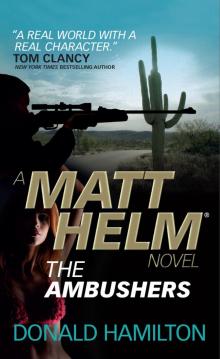 The Ambushers
The Ambushers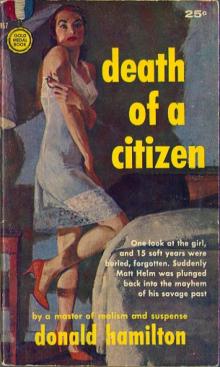 Death of a Citizen mh-1
Death of a Citizen mh-1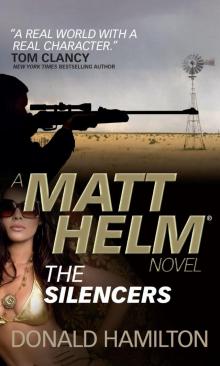 The Silencers
The Silencers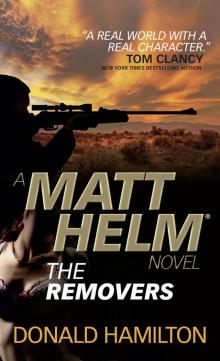 The Removers
The Removers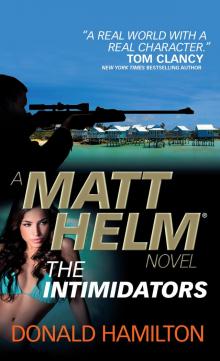 The Intimidators
The Intimidators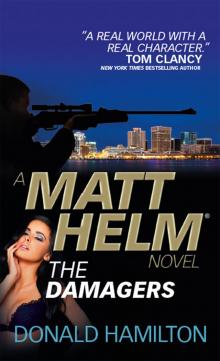 The Damagers
The Damagers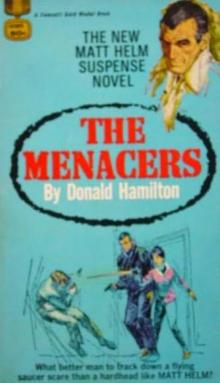 The Menacers mh-11
The Menacers mh-11 The Retaliators
The Retaliators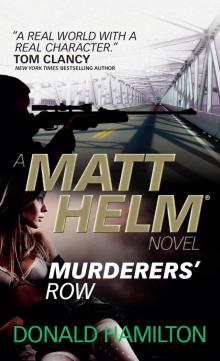 Murderers' Row
Murderers' Row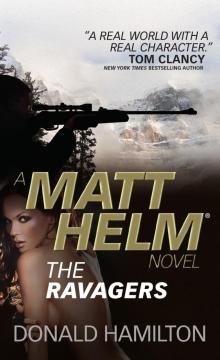 The Ravagers
The Ravagers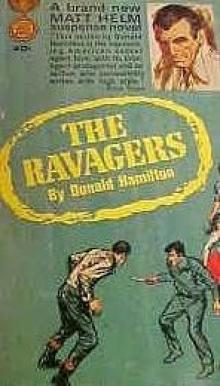 The Ravagers mh-8
The Ravagers mh-8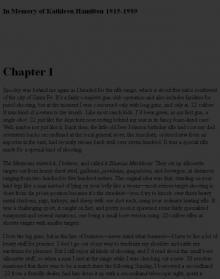 The Threateners
The Threateners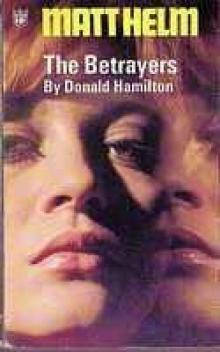 The Betrayers mh-10
The Betrayers mh-10